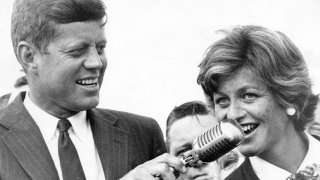
Inside a box at SMU's DeGolyer library sits a collection known as "Dear Dallas."
It contains nearly 800 letters, telegrams and cards written to the city following President Kennedy’s assassination.
SMU’s Executive Director of Communication Kim Cobb spent time analyzing each letter believing they could teach something.
Many were dated the day of the assassination.
Get South Florida local news, weather forecasts and entertainment stories to your inbox. Sign up for NBC South Florida newsletters.
“The desire to share what you’re feeling – something – with anybody even if you don’t think it’s going to change their mind,” Cobb said. “People sent off these letters and telegrams and sympathy cards with the same motivation that people take to social media today, but to me, the difference is this required a lot more thought.”
Much of the nation’s shock, grieve and anger was directed at Dallas which earned the moniker "City of Hate."
“It’s one reason people were so quick to blame Dallas,” Cobb said. “This was a center of ultra-conservative thought that had drawn a lot of criticism toward the city.”
Yet, Cobb was surprised by what she discovered.
Her initial takeaway was the majority of letters blamed Dallas, but after cataloging each one she was surprised there were more sympathetic letters toward the city.
However, the tone of letters shifted once alleged assassin Lee Harvey Oswald was shot and killed on live television.
“The telegrams reflect this in those hours right after Oswald was murdered on live television, it was ‘How could you people be so incompetent?’ It was a major shift,” Cobb said.
The letters belonged to Mayor Earle Cabell’s papers donated to the university. They also contain his replies to those most sympathetic, including fellow Texans and children.
In one Cabell writes to a child, “Thank you for your very nice letter and your good wishes. I concur with your teachers that the people of Dallas will not be blamed for the death of the president.”
It’s a blame the city spent decades trying to overcome.
Sixty years later Cobb believes the letters provide insight into our past and present.
“I think it’s human nature,” Cobb said. “Even the most cynical of us has affection for people and places so when something shatters that illusion we have of ourselves, we look for meaning. So in my mind a lot of these letters were a search for meaning.”

